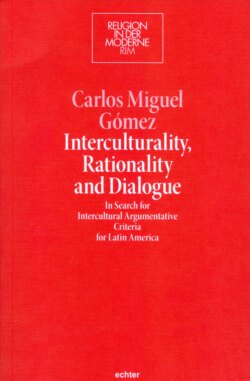Interculturality, Rationality and Dialogue

Реклама. ООО «ЛитРес», ИНН: 7719571260.
Оглавление
Carlos Miguel Gómez. Interculturality, Rationality and Dialogue
Interculturality, Rationality. and Dialogue
CONTENTS
Acknowledgements
Note on the Quotation of Sources in Spanish
List of Diagrams
Introduction
1. The Argumentative Dimension of Intercultural Dialogue. 1.1. Introduction
1.2. The Context of Dialogue
1.2.1. Between Inculturation and Dialogue: The Challenges of the Latin American Catholic Church
1.2.1.1. The Commitment of the Church with Indigenous Peoples
1.2.1.2. The Gospel and the Cultures
1.2.2. The Struggles for Recognition of Indigenous Peoples and the Emergence of Multicultural Models
1.2.2.1. Indigenous Reconstructed Claims and Regained Rights
1.2.2.2. Democratic Participation as Intercultural Deliberation
1.2.2.3. Legal Pluralism and the Resolution of Intercultural Conflicts
1.3. The Borders of Dialogue
1.3.1. The Normative Base of Intercultural Dialogue
1.3.2. Grice’s Conversational Maxims Interculturally Examined
1.4. Difficulties for Establishing Intercultural Normative Criteria for Dialogue
1.4.1. The Objection of Incommensurability as Radical Relativism
1.4.2. The Objection of Normativity as Neo-Colonialism
1.4.2.1. Interculturality as a Critique to Illegitimate Universalization
1.4.2.2. Between Dialectical and Dialogical Dialogue
1.5. Conclusion: A First Insight into the Function and Shape of the Intercultural Normative Criteria for Dialogue
2. Heterogenic Rationalities. 2.1. Introduction
2.2. Rationalities as Culturally Relative Types of Logic
2.2.1. Problems with the Hypothesis of Logical Relativism
2.3. Rationalities as Incompatible Worldviews
2.3.1. The Case of Andean Rationality
2.3.2. Criticisms of the Idea of Different ‘Conceptual Schemes’
2.4. Rationalities as Alternative Reasoning Patterns
2.4.1. Rival Explanatory Patterns
2.4.1.1. Mythical Causality
2.4.1.2. Non Causal Explanatory Principles
2.4.2. Competing Patterns of Justification: the Word of Origin as Primary Ground
2.5. Conclusion
3. Towards an Intercultural Reasonableness. 3.1. Introduction
3.2. From an Intercultural Theory of Rationality to a Notion of Intercultural Reasonableness
3.3. Assessing Reasonableness Interculturally: The Pragmadialectical Model
3.3.1. Does the Pragma-dialectical Approach offer an Interculturally Valid Model of Reasonableness?
3.3.1.1. The Pragma-dialectical Model of Reasonableness is Mono-cultural
3.3.1.2. The Pragma-dialectical Reasonableness does not avoid Relativism
3.3.1.3. A Critical Discussion does not fit the needs of Intercultural Dialogue
3.4. Rethinking Reasonableness Interculturally. 3.4.1. Rationality and Reasonableness
3.4.2. Intercultural Reasonableness as Multi-logical Recognition and Interaction
3.4.3. Some Interculturally Unreasonable Moves in Dialogue
3.4.3.1. Appeal to radical difference
3.4.3.2. Illegitimate Universalization
3.4.3.3. Fictitious consensus
3.4.3.4. Argumentative Violence
3.5. Conclusion
PART II. BUILDING INTERCULTURAL CHAKANAS
4. The Interconnection of Traditions I: An Interpretation of Intercultural Disagreements. 4.1. Introduction
4.2. What is a Claim?
4.2.1. Claims as Complex Speech Acts
4.3. Types of Claims
4.3.1. Types of Conflicting Claims in Latin American Intercultural Dialogues
4.3.2. Habermas’ Argumentation Theory Interculturally Revisited
4.4. Types of Disagreements
4.5. Presuppositions of Disagreement
5. The Interconnection of Traditions II: Discursive Interpellation. 5.1. Introduction
5.2. Challenge
5.3. Demand
5.4. Offering
5.5. ‘Oppression’ and ‘Shared Problems’ as Factors of Interdependence
Conclusion: Pluralistic Argumentation. 1. The Justification of Argumentative Intercultural Criteria
2. The Process of Intercultural Dialogue in Latin America
3. The Outcome of Intercultural Dialogue
4. The Limits of the Argumentative Dimension of Intercultural Dialogue
Appendix: List of Intercultural Argumentative Criteria
Bibliography
RELIGION IN DER MODERNE. Herausgegeben von Matthias Lutz-Bachmann, Thomas M. Schmidt und Michael Sievernich
Отрывок из книги
Carlos Miguel Gómez
Interculturality, Rationality and Dialogue
.....
Bibliography
In Chapter 3 we will develop an initial set of intercultural argumentative criteria based on the notion of intercultural reasonableness. These criteria allow us to identify some common argumentative moves (intercultural fallacies) that should be avoided and corrected, since they neither allow for the recognition of heterogenic positions in their own terms, nor grant them the opportunity to participate in dialogue. Accordingly, the criteria of intercultural reasonableness allow for a judgment over the way in which heterogenic reasons are used in dialogue and represent the conditions for a pluralistic model of argumentation; that is, an exchange of reasons in which it is both possible to use heterogenic forms of argumentation and to decide between them. However, even though these criteria represent a necessary condition for dialogue in Latin America, they are not yet sufficient.
.....